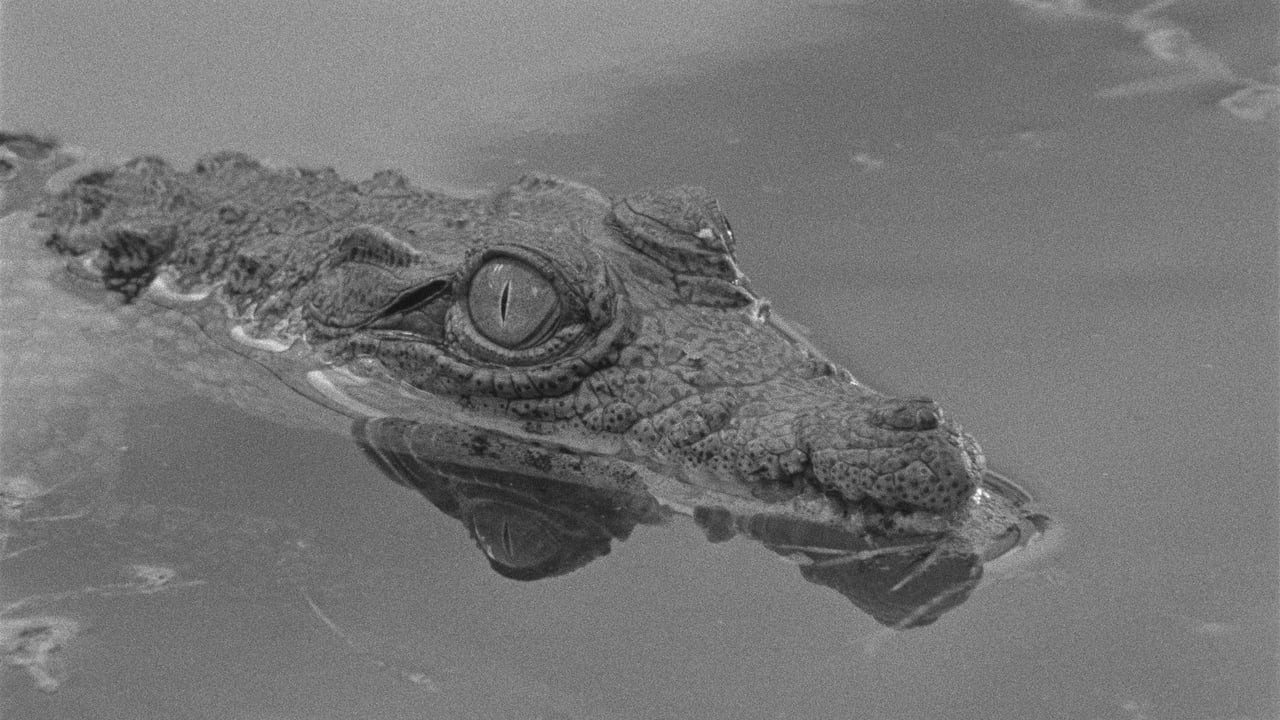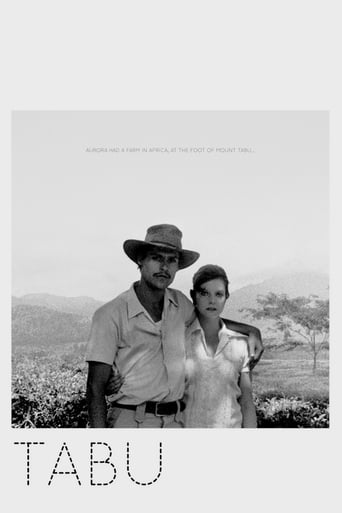

Terrible acting, screenplay and direction.
... View MoreBad Acting and worse Bad Screenplay
... View MoreA different way of telling a story
... View MoreThe movie's not perfect, but it sticks the landing of its message. It was engaging - thrilling at times - and I personally thought it was a great time.
... View MoreTabu (2012/I) is a Portuguese movie co-written and directed by Miguel Gomes. The film begins in modern-day Portugal, where an old woman named Aurora (Laura Soveral) is leading a quiet and sheltered life. We know there's some mystery about her earlier life, but we don't know what it is. Aurora becomes ill, and when she realizes that she won't recover, she shares a man's name with a neighbor, and asks the neighbor to find this man.The film then shifts to Africa about fifty years earlier, at a time when Aurora was a young woman. (The young Aurora is portrayed by the lovely Portuguese actor Ana Moreira.) Portugal is still the colonial power, but the anti-colonialist revolutions are beginning.What happens during this period is full of wild romance, with Aurora at its center. The man named by the dying Aurora is the link that brings the two plots together.Although this movie was completed in 2012, it has the look of earlier film. This is partly because it's shot in black and white, and partly because the director has chosen to remind us that great movies have been with us for many, many years.We saw Tabu on DVD, where it worked well. It's not the perfect film for everyone, but it's a good choice if you want something foreign and different.
... View More"Tabu" is a rather odd but beautiful little film that defies easy classification. The first part is a drama about three women in an apartment building in modern day Lisbon. Aurora started off life as a woman of privilege who later marries a well-to-do landowner. The years haven't been kind to her and she seems to be losing her grip on reality. Her daughter employs a woman, Santa, to look after her but otherwise has no contact. Santa hails from a former Portuguese colony and is trying to adapt to western culture. A third woman, Pilar is a concerned neighbor who demonstrates on behalf of social causes. Together the three women represent different ways of coping with Portugal's history. Aurora for whom the past was a kind of golden age; Santa who has chosen to remain in Portugal and adjust to her new world and Pilar who appears to embrace activist political causes perhaps as a way of atoning the past.The second part is a steamy melodrama that unfolds as a memory sequence involving a young and beautiful Aurora who's stuck in a dull marriage to a rich man in colonial Africa. Later she meets a man and begins a passionate relationship which could threaten both of their futures. There's also a crocodile who first appears in a prologue when it consumes a despondent man whose love has passed away. A crocodile appears again as a gift to Aurora from her husband. That crocodile would haunt Aurora in her later years as if it were an avenger seeking the souls of those who've been unwilling or unable to accept life's lack of concern for our emotional attachments. This idea of the past as perhaps best forgotten is heightened by the callous disregard the younger generation displays for the older. "Tabu" is not for everyone. Those who gravitate toward plot-driven story lines will be frustrated but if you enjoy a thoughtful, introspective character drama this is a treat.
... View MoreI always loved voice-overs in films. Almost as much as I hated all attempts of realism in films.So called "reality" is the worst kind of delusion. It makes us feel that we have time when in truth there is not time. It binds us to the moment and makes us blind to what it means. A story can reveal tragedy but when you are in the midst of it, in the "reality" of it, you only see that "reality" which makes everything trivial.That's the magic of the voice-over. You see everything happening as in "reality" but the voice-over pulls you back and the reveals the greater truth, the story.In this film, this is cleverly utilized. The story is banal for sure but the voice-over reveals that what was conceived as "real" was only a dream. This film stays in the voice-over and shows how most of our talk is just blabber and not necessary to understand what is going on. In the second part of the film, which is the part in which the voice-over takes over, there is no dialogue to be heard and I, as the viewer, could not be more happy about it. The paradise, which is the title of this second half of the film, is, to me, the blessing of not having to hear the blabber. All other sounds are revealed and the director makes a point out of it. These sounds do not disrupt the magic. Only the blabber would do that and bring forth the trivial.
... View MoreThe title Tabu is one that looms large over film history recalling the collaboration of two pillars of silent cinema, F.W. Murnau and Robert J. Flaherty, about a forbidden love story (the film's taboo) between a fisherman and a holy maid, and splits its story between two clear sections titled "Paradise" and "Paradise Lost". In Gomes' film, we begin with a prologue of a Portuguese man's expedition to Mozambique in search of his lover's soul, ending in him being devoured by alligators and being reborn as one, before moving to the first section of the film, titled "Paradise Lost". In it, we follow María, a woman activist who's neighbour with a senile lady with a gambling addiction by the name of Aurora, and her African maid Santa. Aurora is poor and raving madly about her fictitious exploits in Africa and her strange dreams of being raped by apes, all the while being suspicious of Santa, accusing her of voodoo witchcraft. Eventually the woman's health declines rapidly, and as a last wish she asks María to look for a man called Ventura. María eventually finds Ventura but is unable to bring him to Aurora before her death. After the funeral, Ventura joins with María and Santa and begins telling the story of his affair with Aurora (played by the beautiful Ana Moreira), where he confirms she did actually live in Mozambique, and where he tells of his forbidden romance with her while she was pregnant of her husband's baby. Here we begin the section titled "Paradise", detailing the story of their affair and of their Portuguese social circle, back when Mozabique was still a colony, which makes up the larger bulk of the film.One of the aspects that surprises outright is just how brilliantly Gomes manages to capture this story from an aesthetic point of view. Visually the film is of course emulating an older style of filmmaking, right down to the choice of working in an academic ratio (1.37:1), but his visual style is perhaps less reminiscent of Murnau's, and rather seems to emulate 50s Kenji Mizoguchi and early Satyajit Ray. There is that same remarkably organic, unimposing and ever so elegant kind of black and white photography which is harder and harder to find today (even the first half which is filmed in contemporary Lisbon), all the while the film works with a very limited array of sounds and music providing a background for a story told otherwise entirely through the voice-over of Ventura.The voice-over eventually leads to many labyrinthine stories regarding the lives of many people he met in Mozambique, not least the members of his own rock n' roll band, specifically Mario to whom Ventura was a sort of right hand man. The stories are all vivid and told with great detail and humour, but essentially they are a smokescreen to what's otherwise a very simple tragedy of forbidden love, beautifully told. In many ways, even through these many decade-spanning branches, the film's narrative closely resembles the works of Gabriel García Márquez. The love story at the heart of it is one forbidden due in large part to the social aspect, that Aurora is a pregnant, married woman, but all throughout the film there's another side suggesting the nature of this affair's forbiddance is also of a divine kind - it is, precisely, taboo. There are many elements of magical realism at play, from the cryptic opening tale to the encounters with witch-doctors and seers, the latter foreboding the tragic end to the affair. Even the location, set around a fictional Mount Tabu, and the attitude adopted by Dandy, Aurora's pet alligator, seem to plot to make their fates meet. There is a strong mystical power at play, one that, like many of Márquez's most classic works, seems to exist as an unholy hybrid between local and European beliefs product of colonization.Evidently, this affair is doomed from the start. The inversion of the original Tabu titles, leading to an almost sardonic remark over the latter section, allows us to see and know these characters' fate before we see their relationship progress, and thus the development of their relationship is all the more arduous and cathartic.In the Q&A with Miguel Gomes, he mentioned that he had no ulterior motives to tell this story, no overlapping ideas as he does not consider himself to be a smart man and therefore does not consider his ideas "worthy" enough to sustain a film (perhaps in admitting that he's smarter than a vast majority of the filmmakers in the BAFICI), but instead he concentrates on catching glimpses, moments and developing a story out of them. Effectively this is not a film of big ideas and enlightenment, roughly the overarching themes could be related to adultery and natural law with hints of a cultural clash and the likes, but it's never really about that. It's about creating a story that's affecting like no other, and that he's managed to create. With this, Gomes becomes a cinematic force to be reckoned with, and one I'll be following very closely from now on.
... View More